
A Maryland-based early childhood education company is opening a second location in the Reston-Herndon area.
Celebree School will celebrate the grand opening of its newest location at 12700 Sunrise Valley Drive with a spring carnival on Saturday, April 27. The event, which will run from 10 a.m. to 1 p.m., will feature magic shows, a bubble station and various food vendors.
The new school is owned and operated by Manmeet Sarang, a local entrepreneur with 20 years of experience in the mortgage industry.
“We are so excited for the opportunity to work with and assist in the education of children here in the Herndon and Fairfax County area,” Sarang said in a press release. It’s extremely fulfilling to be able to help children grow and develop, but now through Celebree Schools’ high-quality standards. My team is looking forward to raising the bar for early childhood education in the community.”
Celebree School’s programs cater to infants, toddlers, preschoolers, and school-age children up to 12 years old, emphasizing a blend of curriculum-based education and play to promote social skills and values.
According to the release, the school adheres to Virginia’s early education standards and offers both part-time and full-time care, with parents welcome to visit anytime.
Originally called Enchanted Child Care, the company was founded by current CEO Richard Huffman in 1994 in Ellicott City, Maryland, according to Celebree’s website. In 2002, Enchanted Child Care was rebranded to Celebree Schools.
Since beginning its franchising efforts in 2019, Celebree School has expanded to 44 schools and enlisted 54 owners for over 100 sites, including three in Fairfax County, across 14 states. The brand currently serves more than 4,570 children.
Celebree locations can also be found in Reston on Sunset Hills Road and at Valo Park in Tysons.
“We take great pride in supporting exceptional entrepreneurs like Manmeet in achieving their business aspirations,” Huffman said in the release. “In our ongoing efforts to grow the reach of our brand through franchising, it is crucial to collaborate with dedicated community leaders who share a deep commitment to early childhood education. Witnessing the establishment of these schools fills me with immense satisfaction and happiness. I am confident that she is the ideal franchisee to propel our mission to new heights.”
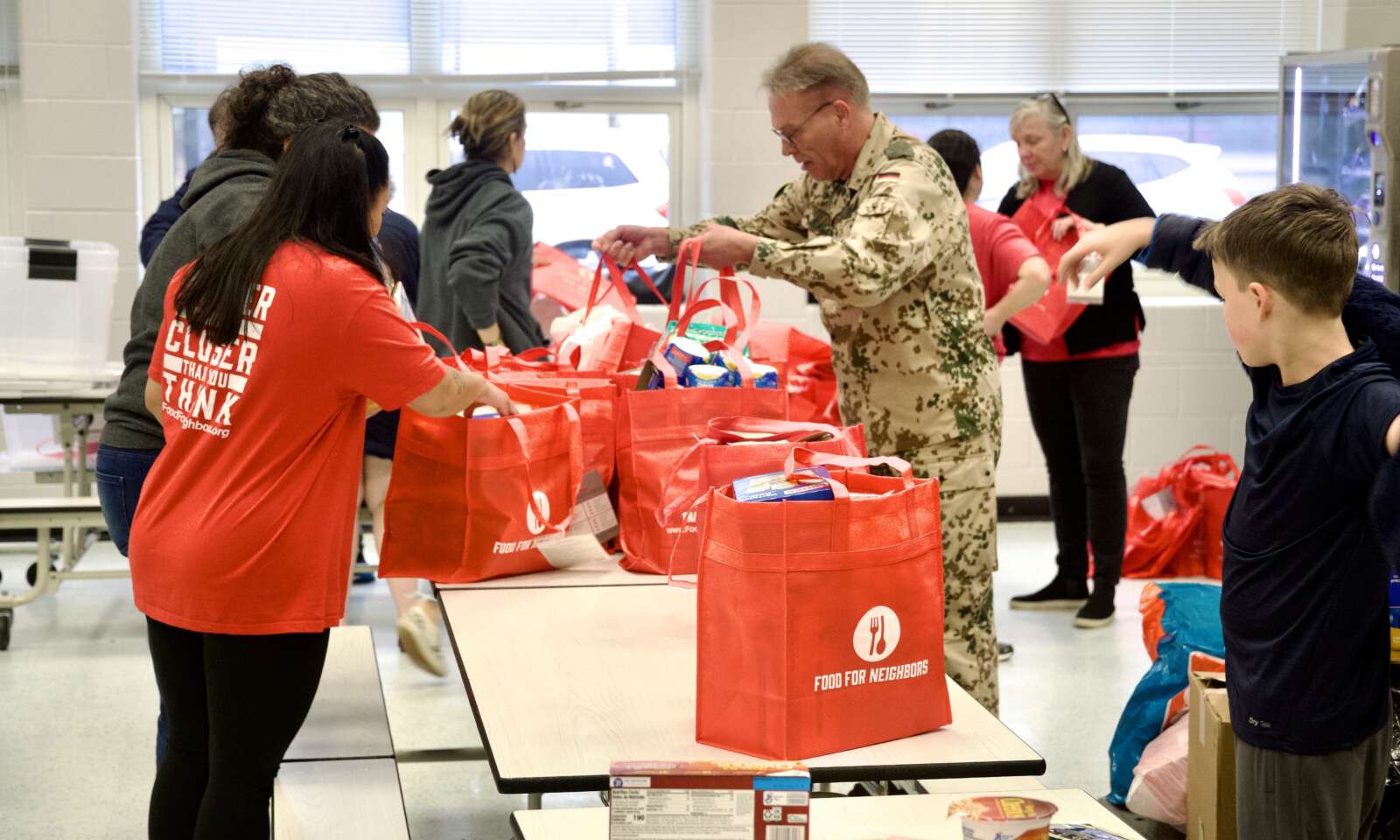
The Reston-based German Armed Forces Command partnered with Food for Neighbors to help tackle food insecurity among teenagers on Saturday (March 9).
The office, which serves as the German military’s liaison to the U.S. and Canada on issues related to defense technology and weapons, helped sort nearly 3,400 pounds of donations at Herndon Middle School. It also presented a donation of more than $5,500 to Food for Neighbors.
A local nonprofit organization that provides food to middle and high school students, Food for Neighbors plans to use the funds to address teen food insecurity in partnering schools throughout Northern Virginia.
“I feel honored and privileged to present this donation as our contribution to your outstanding and very important cause,” Col. Joerg Dronia, commander of the German Armed Forces Command in the U.S. and Canada, said. “The funds were raised at the 2023 Christmas Market at our HQ here in Reston. The women and men serving there, nominated your charity organization as the prime recipient. I am more than pleased to follow their suggestion to support those in need.”
This is the second year that the German Armed Forces Command worked with Food for Neighbors after the organization participated in a similar sorting event in January 2023.
Dronia said the organization sees itself as an integral part of the local community.
“I have to repeat what I said already last year: Although, we are far away from home, you all make us feel at home here in Reston,” he said at the collection and sorting event.
Food for Neighbors founder and executive director Karen Joseph said the organization currently helps 7,500 students in 47 schools.
“In addition to representing one of our greatest NATO allies, the German Armed Forces Command is an excellent example of what it means to be a good neighbor,” Joseph said. “We are one of many organizations that have benefited from their giving spirit, and we thank them for all that they do to help our most vulnerable community members.”
Nearly 65% of Herndon Middle School’s students qualify for free and reduced-price meals, according to the Virginia Department of Education.
“Our students don’t need fancy shoes. They need food and love. By coming together over food, we create a community,” Herndon Middle School Family Liaison Salazar Laske said.
Overall, the effort sorted and collected more than 26,500 pounds of food and toiletries.
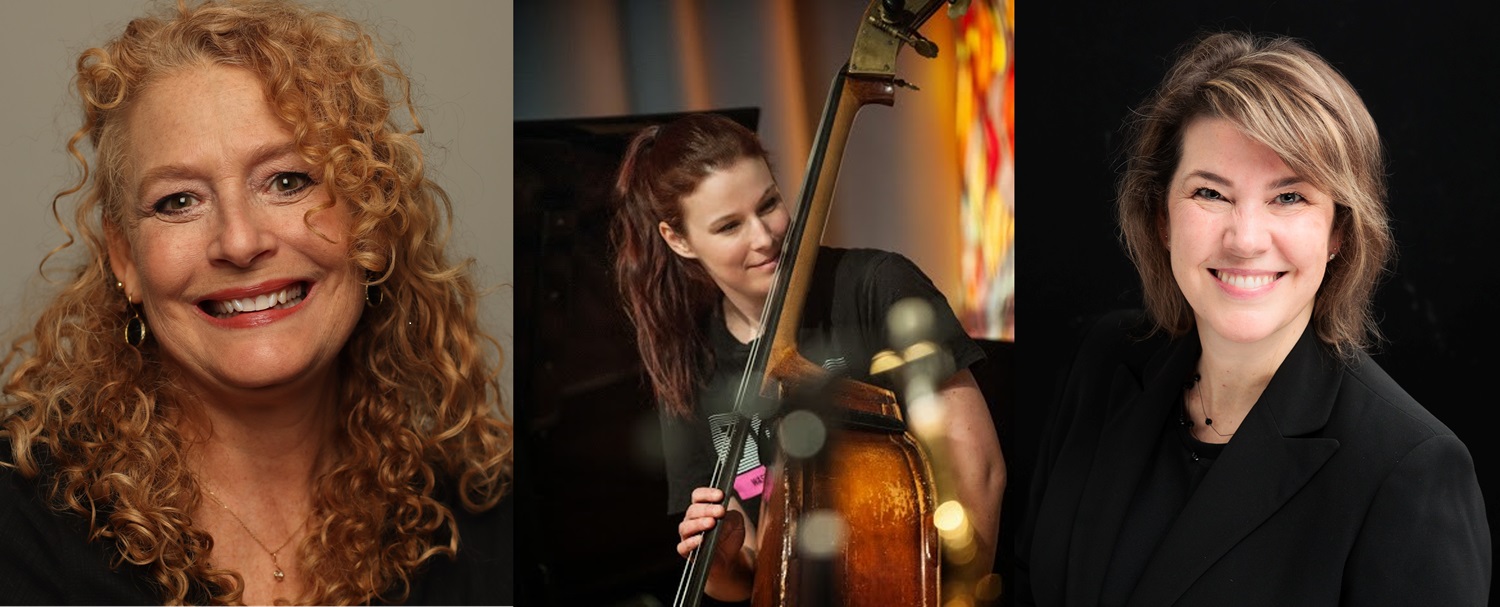
Three Fairfax County Public Schools teachers will now be able to pursue unique arts projects with their students, thanks to financial assistance from the Wolf Trap Foundation for the Performing Arts.
A nonprofit that supports and programs Wolf Trap National Park, the foundation announced on Feb. 20 that it has awarded 13 grants from an annual program for D.C. area educators who teach music, dance or theater at public schools.
This year’s FCPS recipients were Fairfax High School dance arts teacher Meredith Barnes, Groveton Elementary School music and orchestra teacher Karine Chapdelaine-Walker, and Robinson Secondary School’s middle school bands director, Tiffany Hitz.
In addition to getting funding for their projects, the grant winners get to bring their classes to Wolf Trap for a “celebratory day of learning” on April 25 that will include performances by the high school students at The Barns at Wolf Trap, according to a press release.
“Wolf Trap’s Grants for Performing Arts Teachers provides teachers with grants to fund innovative performing arts projects,” said Cate Bechtold, Wolf Trap Foundation’s director of internships and community programs. “Because of their grants, teachers can expand the scope of their projects, bring in professional artists, incorporate new technologies, or create additional resources, providing extra learning opportunities for their students.”
According to the release, Barnes requested a grant for a show called “Dance for a Change” that Fairfax High School students will develop with a dance historian and guest artists from the Bethesda-based theater organization Imagination Stage.
“Students will choreograph small group pieces by drawing inspiration from American dance icons who used their work to address injustices,” the release said. “This will allow students to leverage the power of the arts as a means of social commentary.”
Chapdelaine-Walker and Hitz are both among the recipients of the program’s first-ever middle school grants.
For her project, titled “Musicians for a Change,” Chapdelaine-Walker will work with Groveton Elementary’s sixth-grade orchestra students to create a “unique musical piece centered around student-identified social justice issues” to demonstrate music’s value “as a tool for advocacy and self-expression.”
Meanwhile, Hitz’s band students will learn the piece “All My Heart” — with its composer Michael Markowski as their mentor.
“Students will have the opportunity to connect with a professional composer and meaningfully engage with the composition process, allowing them to experience a new instrumental arrangement, and explore the composer’s experience in creating work,” the press release said.
Funded by contributions from the defense contractor General Dynamics, the Grants for Performing Arts Teachers program awards up to $5,000 to high school teachers and up to $2,500 to middle school teachers. The exact amount depends on each project’s scope and needs, but the majority “require the full amount,” according to the Wolf Trap Foundation.
Last year, the foundation awarded only eight grants, including ones to Annandale High School orchestra director Annie Ray and Mount Vernon High School music teacher Al Rodriguez. Ray more recently gained national recognition as the winner of the 2024 Grammy Music Educator Award.
In addition to the FCPS grantees, the 2024 grant recipients include teachers from D.C. and Loudoun, Montgomery and Prince George’s counties.
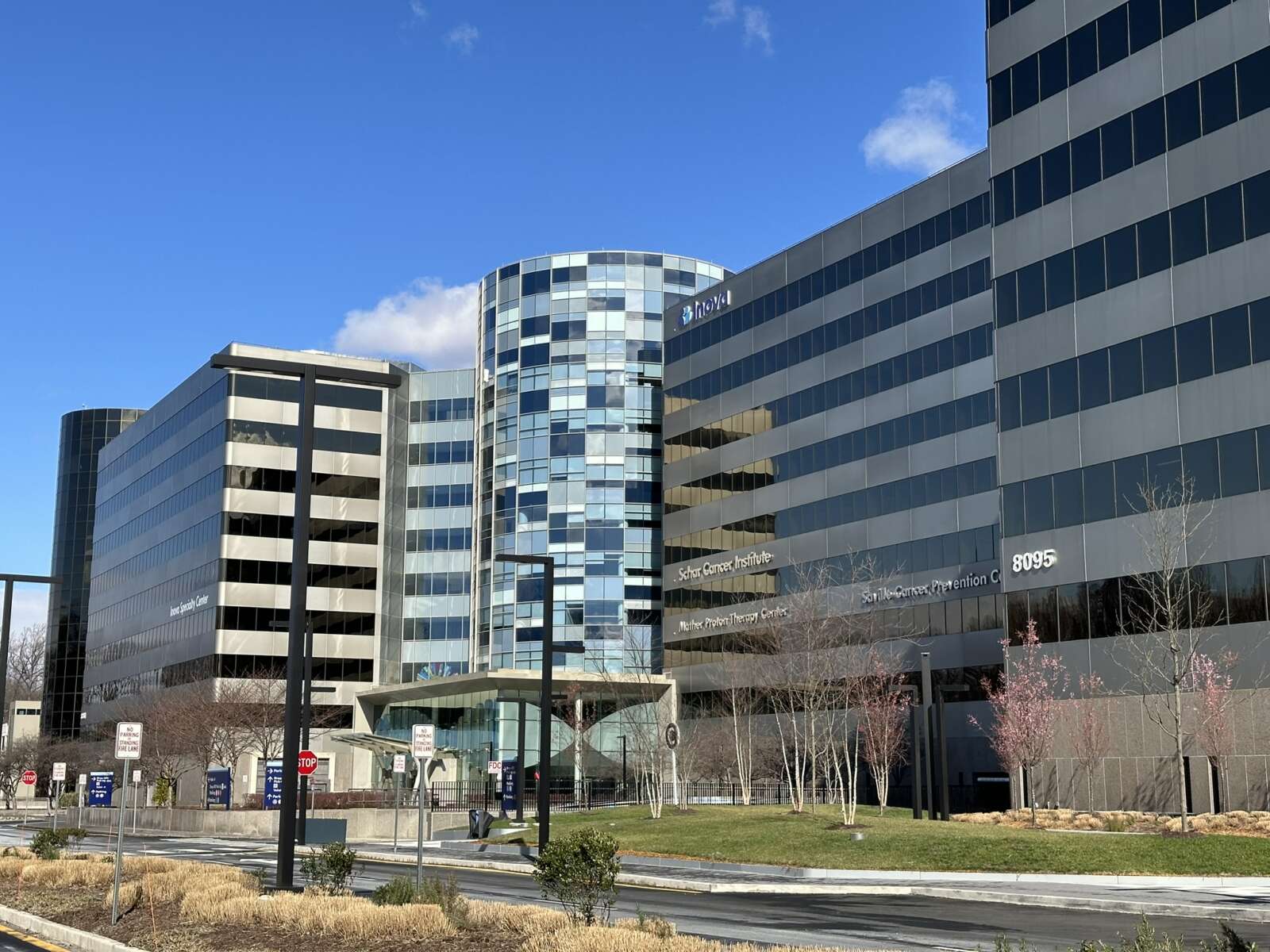
The University of Virginia is expanding its presence in Fairfax County.
The Charlottesville-based institution will add a new site for its Northern Virginia campus next year in Merrifield, where it has leased 55,000 square feet at the Inova Center for Personalized Health (8095 Innovation Park Drive), the Washington Business Journal reported last week.
According to the WBJ, UVA will move into the second and third floors of Building C on Inova’s campus, which opened in 2015 and features a conference center, a sports medicine hub, a fitness and rehab center, and cancer services in the Schar Cancer Institute. Designated for office and educational uses, Building C already hosts health care programs for Shenandoah University.
Intended to serve the university’s significant base of students from the D.C. area, UVA Northern Virginia’s Fairfax site will house a variety of degree programs as well as classes for high school students and workforce training, the WBJ says:
The university’s new space, slated to open in January, would serve as a D.C.-area base for programs across the university’s schools and departments, such as master’s degrees in health or engineering. It’s also designed to serve as a hub for education beyond its degree programs: classes for high schoolers in creative writing, forensic science and coding set for this summer; or, perhaps, trainings for companies, in which employers would cover the costs for their employees.
The site will also be used as a space for testing new programs that could later be expanded to other campuses.
“The populations are different,” UVA Northern Virginia Dean and CEO Gregory Fairchild told the WBJ. “Thinking and testing you’ll see us do will probably — potentially, over time — lead to something different here that we wouldn’t do in Charlottesville.”
UVA launched its Northern Virginia campus in Rosslyn on Sept. 22, 2021, offering courses for its schools of business, engineering, education, data science and continuing and professional studies. Officials said at the time that the Arlington site was “just the beginning” of their plans for the region.
The university previously shared space with Virginia Tech at the Northern Virginia Center (7054 Haycock Road) in Idylwood, but it left in 2020 after declining to support a redevelopment. The property was sold last fall to a development team that will transform it into a construction hub with housing, a Virginia Tech research lab and a headquarters building for HITT Contracting.
UVA’s new site at the Center for Personalized Health will build on its existing collaboration with Inova Fairfax Hospital, which serves as a teaching hospital for the university’s medical students.
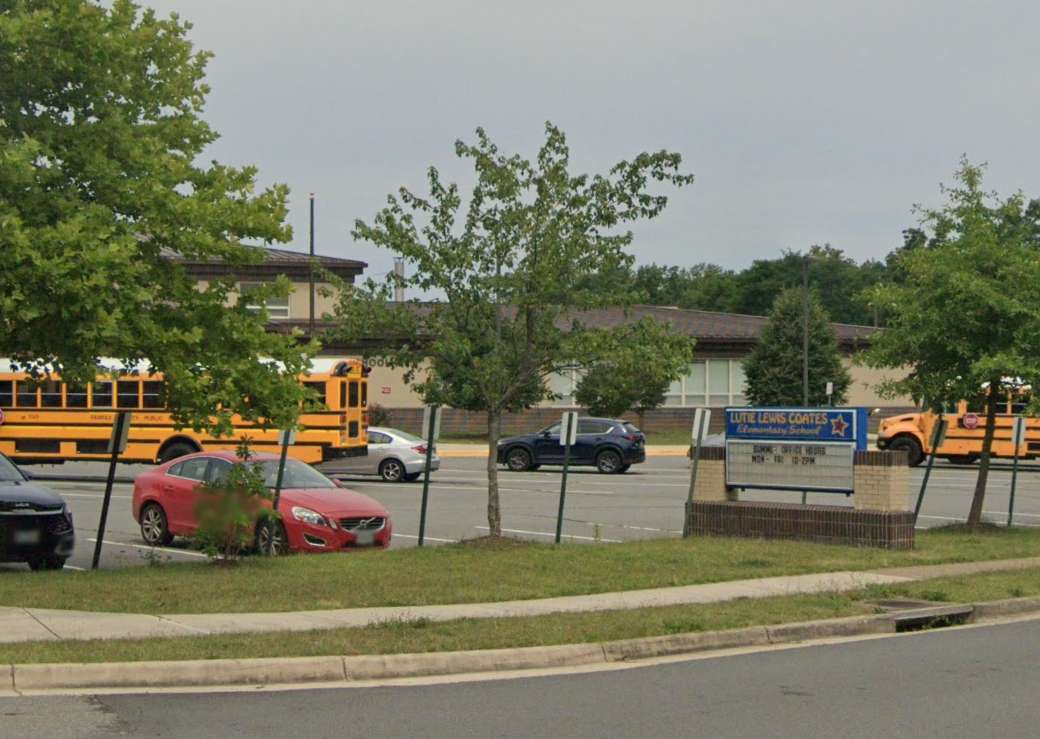
Fairfax County Public Schools is attempting to streamline its approach to managing capital projects to reduce costs and overcrowding in schools.
The school board approved a Capital Improvement Program (CIP) last Thursday, Feb. 8 for fiscal years 2025-2029 with multiple amendments intended to help lower costs, speed up select school renovations, meet green energy goals and enhance the process for tracking infrastructure projects.
The $1.3 billion, five-year plan allocates funding for the following projects:
- Construction of the planned Dunn Loring Elementary School
- A new wing to Justice High School
- Relocation of modular buildings
- Renovation of 18 elementary schools, two middle schools and two high schools
- Acquisition of land for one new high school
The revised CIP highlights a need to address overcrowding and capacity issues within the school system, with many schools nearing a critical tipping point.
Coates Elementary School in Herndon, for instance, is currently operating at 131% of its student capacity — a figure projected to rise to 172% by 2028. Crowding has been an issue for over 10 school years, according to the CIP.
At the moment, eight elementary schools, one middle school and eight high schools are operating beyond capacity, even though student enrollment has dipped from pre-pandemic levels and is expected to level out over the next five years.
Several other elementary schools, including Parklawn in Lincolnia, Mantua and Bailey’s, are expected to surpass student capacity in the coming years, per the capital plan. The same is true of Irving, Kilmer and Glasgow middle schools and Westfield, Centreville, McLean, Woodson, Robinson and Chantilly high schools.
The school board voted last week to add Coates and Parklawn as priorities for boundary adjustments, even as several members argued a more comprehensive approach to overcrowding issues is needed.
Parklawn is 96% capacity right now, but it’s projected to reach 112% by the 2028-2029 school year. It will still trail McLean’s Kent Gardens Elementary School, which will be at 113% capacity even after boundary adjustments were approved last year.
“The problem that I see, while we’re fixing these two tonight, if we don’t fix the process and fix other schools, we’re going to have Coates and Parklawns popping up like hotcakes across Fairfax County, and I don’t want to be in that position,” At-Large School Board Representative Kyle McDaniel said.
The board tasked Superintendent Dr. Michelle Reid with formulating a “facility infrastructure policy” and establishing a system to track projects to be presented to the board later this year.
“I see an eagerness on this board, which I’m very excited about, to really look holistically and comprehensively at our infrastructure needs, our funding, and really get sort of our hands wrapped around the policies that relate to infrastructure, but also an overarching policy that guides our decisions regarding infrastructure,” Mason District School Board Representative Ricardy Anderson said.
Board members also asked Reid to propose options for funding capital projects.
Hunter Mill District Representative Melanie Meren expressed an interest in initiatives such as “swing spaces” — pre-existing facilities that students and staff can temporarily relocate to during construction.
“The benefit of that is that renovations could go quicker, which means they could also cost less money,” she said.
Over in neighboring Arlington County, a plan to turn an elementary school into a swing space got nixed last year after an outcry by current and future parents.
Reid is expected to present cost-saving options and the facility infrastructure policy to the school board on April 25. Additionally, she is scheduled to submit a plan for tracking infrastructure projects on May 7.
Image via Google Maps

Two Virginia lawmakers are proposing sweeping measures to improve the state’s provision of special education services as criticisms from parents and the federal government over Virginia’s compliance with the Individuals with Disabilities Education Act continue.
Sponsored by Del. Carrie Coyner, R-Chesterfield, and Sen. Barbara Favola, D-Arlington, the proposals would create a statewide system to oversee the development and use of individualized education programs (IEPs) for students with special needs, require more training for educators about how to provide inclusive special education instruction, set up eight regional “special education parent support centers” and provide additional specialists to divisions.
“It’s no secret we are failing our students with disabilities in Virginia,” said Coyner during a Jan. 30 hearing on the legislation.
Federal law requires states to provide all students with disabilities a “free appropriate public education.” Among the requirements of the Individuals with Disabilities Education Act is that schools must offer an IEP and that “every child should have the chance to meet challenging objectives,” according to a 2017 U.S. Supreme Court decision.
“This bill ensures that there is monitoring of this civil rights law at the state level, and it’s very necessary,” said Kandise Lucas, a special education advocate, during a recent House Education subcommittee meeting.
Virginia has almost 181,000 students receiving special education services this school year, an increase of nearly 7,000 students from a year ago. But the state has struggled to meet the demands of students with disabilities.
Virginia has repeatedly been criticized by the federal government for problems with providing special education services. A June 2020 report by the U.S. Office of Special Education Programs determined that Virginia “does not have the procedures and practices that are reasonably designed to enable the state to exercise general supervision over all educational programs for children with disabilities.”
The Virginia Department of Education disputed some of the findings, saying the federal office included “factual inaccuracies.”
However, in a Feb. 17, 2023 letter from OSEP, the office identified “significant new or continued areas of concerns” with how the state was complying with supervision, dispute resolution and confidentiality requirements in IDEA. In particular, it concluded Virginia “does not have procedures and practices that are reasonably designed to ensure a timely resolution process” for complaints and said at least five districts were not adhering to IDEA regulations.
Individual school divisions have also been faulted by federal officials. In November 2022, the U.S. Department of Education’s Office of Civil Rights found Fairfax County Public Schools, Virginia’s largest school district, had failed (link added by FFXnow) to provide thousands of students with disabilities the education they were entitled to receive during the COVID-19 pandemic.
State reviews have also echoed many federal criticisms. In 2020, the Joint Legislative and Audit Review Commission identified major shortcomings in the state’s provision of special education services, including low-quality IEPs, a lack of knowledge among educators about how to effectively support students with disabilities and shortfalls in the Virginia Department of Education’s oversight of local divisions.
Researchers who reviewed 90 randomly selected IEPs found about half lacked goals for academic progress or improved functioning, which are required by federal law. About 37% of parents believed the services outlined in their child’s IEP were only “somewhat” or “not at all appropriate.”
A third of the special education directors interviewed by JLARC said only half or fewer administrators and general education teachers in their division had the knowledge or skills necessary to support students with disabilities. However, researchers pointed out that state regulations only required “minimal” training in special education for administrators.
Overall, the report observed Virginia students with severe, less common or multiple disabilities graduated at a rate lower than those with more common disabilities. Additionally, it found a persistent shortage of special education teachers, with many school divisions relying on underprepared teachers to fill gaps. Read More
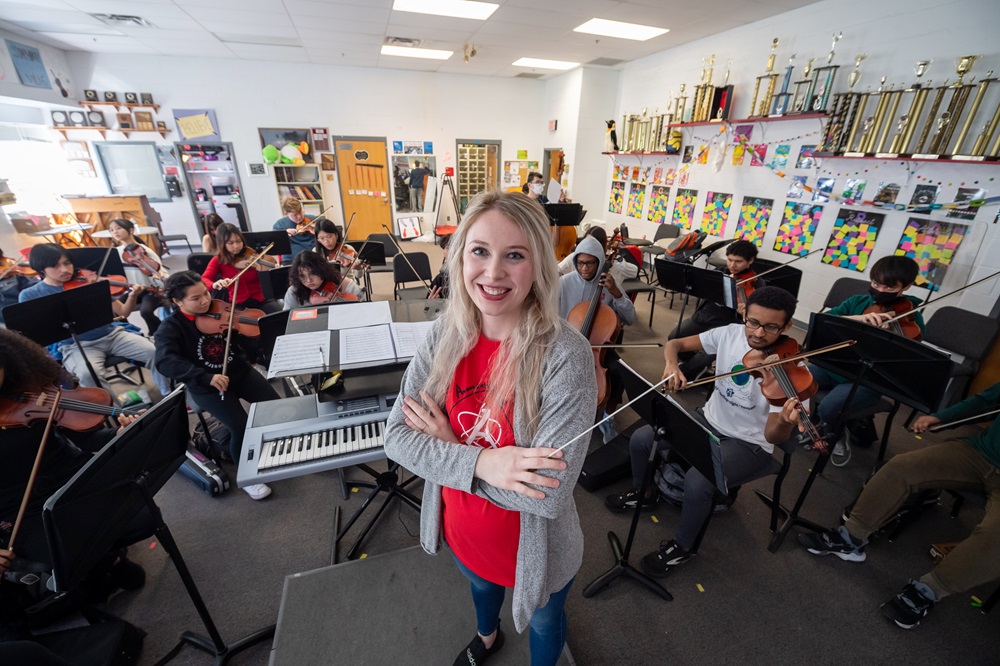
(Updated at 2:25 p.m.) Annandale High School’s orchestra director is on her way to Los Angeles for the upcoming Grammy Awards.
Annie Ray, who teaches music and leads the orchestra program at the school, is the winner of the 2024 Grammy Music Educator Award, CBS Mornings announced today.
Given out by the Recording Academy and Grammy Museum, the award honors music teachers who make a “significant and lasting contribution to the field of music education and who demonstrate a commitment to the broader cause of maintaining music education” in schools. It can go to public and private school teachers of students in preschool through college.
Ray’s family, students and colleagues erupted in cheers when her name was announced during a watch party in Annandale High School’s auditorium, according to Fairfax County Public Schools.
“It’s been a whirlwind experience!” Ray said in a press release. “I’m so thankful to all the people who have poured love into me to allow me to make music. I am honored to have been selected from a remarkable group of educators.”
As the award winner, Ray will get a $10,000 honorarium and a matching grant to support her school’s music program. She was chosen from 10 finalists and more than 2,000 nominees.
Recognized by FCPS just last year as its Region 2 Outstanding Secondary School Teacher, Ray’s three-year tenure at Annandale High has already included the creation of a Crescendo Orchestra for students with severe developmental or intellectual disabilities and an FCPS Parent Orchestra where parents learn to play the same instrument as their kids.
The parent orchestra attracts over 150 parents every year, according to FCPS, which describes Ray as a “passionate advocate for universal access to quality music education.”
“Annie is known for her passion, skill, and belief that every student can achieve greatness,” Annandale High School Principal Shawn DeRose said to FCPS. “Her impact and dedication has made a positive difference in the school community. She truly is an inspiration, and we are so proud of her.”
Before joining Annandale High, Ray taught at Glasgow Middle School in Lincolnia and Annandale Terrace Elementary School.
In an interview with CBS News correspondent Jamie Waxman, Ray said playing in Annandale’s symphony orchestra teaches students confidence and gives them the willingness to make a wrong note. Students describe her as a leader “who doesn’t lead” but instead talks to and encourages them.
The show surprised Ray with a congratulations video from British singer-songwriter Jacob Collier, whose song “Little Blue” became a source of solace after a close friend of hers died.
Ray will officially receive the Music Educator Award at the 66th annual Grammy Awards ceremony, which will air at 8 p.m. this Sunday (Feb. 4) on CBS.

Legislation banning Virginia’s public colleges and universities from providing special treatment in admissions decisions to students related to alumni and donors is on track to head to Gov. Glenn Youngkin later this session.
On Tuesday, the Virginia House joined the Senate in passing the proposal on a unanimous vote. Both bills, which are identical, must now pass in the opposite chambers before they are sent to the governor for his approval.
Youngkin spokesman Christian Martinez has signaled the governor is likely to sign the measures.
“The governor will review any legislation that comes to his desk, but believes admission to Virginia’s universities and colleges should be based on merit,” he said.
The proposed ban comes after the U.S. Supreme Court ended affirmative action at higher education institutions nationwide in June. Since the court’s ruling that race-conscious admissions policies at Harvard University and the University of North Carolina were unconstitutional, schools in the commonwealth have begun changing their admissions policies.
A study by think tank Education Reform Now found “most beneficiaries of legacy preferences are white.” It also identified Virginia as one of five states where a majority of public colleges and universities offer admissions advantages to the children of alumni.
“All that House Bill 48 says is that in considering admissions to college and our public universities here in the commonwealth of Virginia, whether your parents went there or whether your parents are donors to the institution will play no role in deciding who is accepted to the college,” said Del. Dan Helmer, D-Fairfax, who is carrying the House bill, during a subcommittee meeting earlier this month.
Both Democrats and Republicans have supported the change.
“I think it’s absolutely discriminatory to grant special privileges to people based on what their parents did, what they gave, where they went to college,” said Del. Thomas Garrett, R-Goochland, at the same meeting.
Garrett said he’s supporting the proposal to “address discrimination and create a level playing field for all Virginians.”
Last week, the Senate version of the bill, patroned by Sen. Schuyler VanValkenburg, D-Richmond, also passed with unanimous support.
Education Reform Now says more than 100 colleges and universities have ended legacy admissions since 2015, but 787 still used the practice as of 2020.
Photo via MD Duran on Unsplash. This article was reported and written by the Virginia Mercury, and has been reprinted under a Creative Commons license.
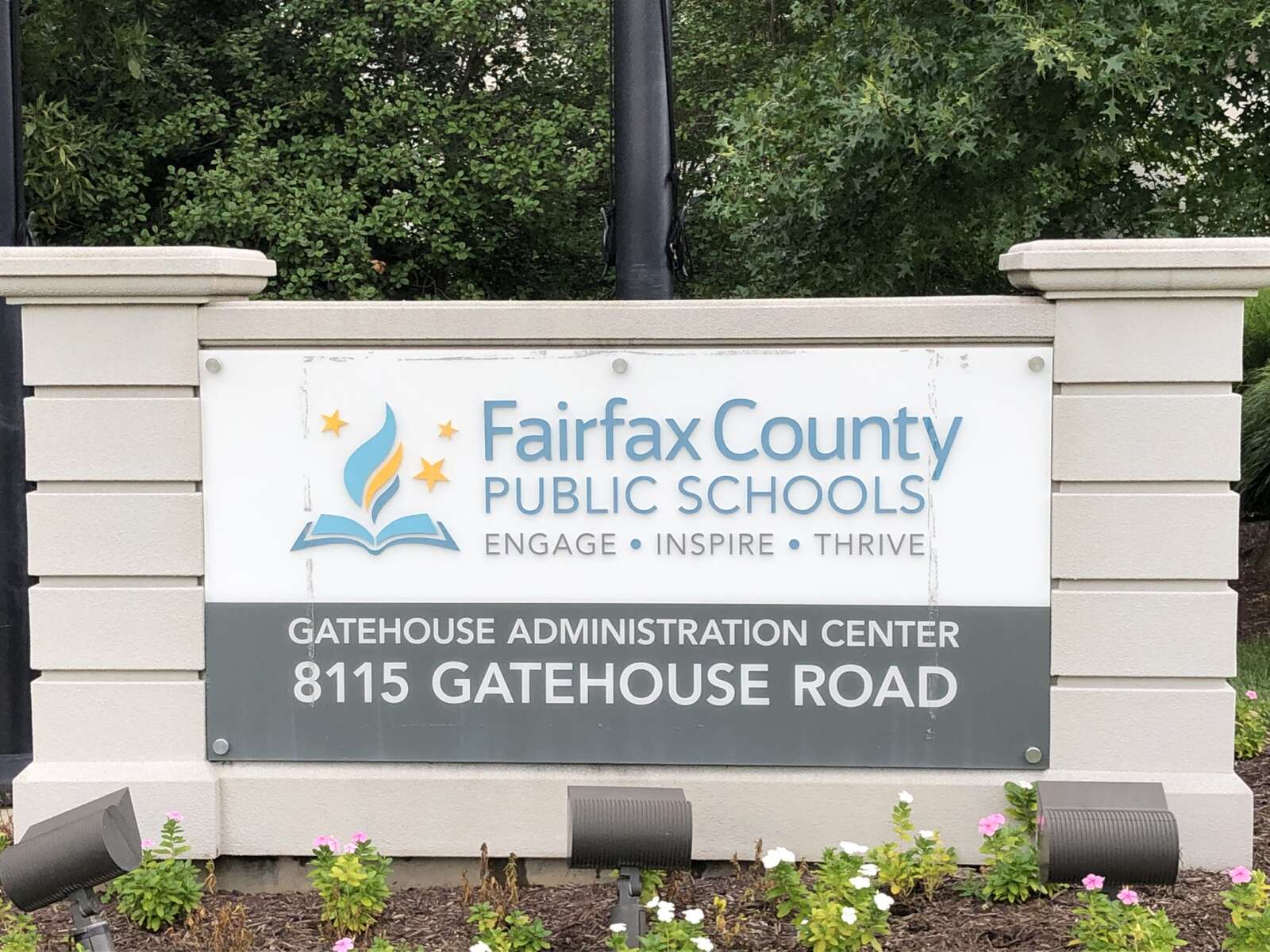
The upcoming capital projects plan for Fairfax County Public Schools comes with questions and uncertainties about future planning to address overcrowding and school capacity issues throughout the school system earlier this month.
Unveiled earlier this month, the new Capital Improvements Program (CIP) covers fiscal years 2025 through 2029. It sets the location, timing and funding of new schools, renovations and other capital projects over a five-year period.
At a Fairfax County School Board work session on Jan. 9, staff shared that the CIP accounts for cost increasesassociated with inflation, labor and materials increases, and prevailing wage.
Mason District Representative Ricardy Anderson pressed staff for answers how when schools in her district — namely Weyanoke Elementary School, Belvedere Elementary School and Luther Jackson Middle School — will be slated for renovation.
“Their buildings are highly problematic,” Anderson said.
Janice Szymanski, the school system’s chief of facility services and capital programs, a newly created position, said staff are working on building consensus on the renovation queue, which was last updated in 2009. The new line-up that’s currently under development isn’t reflected in the CIP at the moment.
FCPS Superintendent Michelle Reid also acknowledged that the renovation process has become “a bit muddled over time,” raising the need for the new queue.
“We don’t intend to be weasely as staff, but I do think we’re building the process while we take the input, so I want to manage expectations,” Reid said.
Major projects within the next five years include construction of Dunn Loring Elementary School, capacity improvements at Justice High School and the renovation of 22 schools.
The 10-year plan projects new construction of a Silver Line elementary school and a western high school, Pinewood Lakes Early Childhood Center, Tysons Elementary School, Pimmit Hills, and Virginia Hills.
Seema Dixit, the board’s new Sully District member, said she was especially concerned about overcrowding issues on the western side of the county.
“That’s where we have to put our brains together and find some creative ways,” Dixit said, noting that land acquisition for some schools is coming far too late.
Staff hope to lay out a new renovation queue that will establish how renovations — major and minor — are planned. The current renovation line-up has funding for planning, design or construction projects through 2031.
So far, a consultant worked with stakeholders in early 2023 to create possible criteria for new facilities. Phase two of the update includes compiling data and reviewing a new queue. The final phase of the project would incorporate the new system into the annual CIP and future bond referenda.
School board members also lamented a lack of sufficient progress on pursuing net-zero energy goals. Solar power purchase agreements are in place for Annandale High School and Mason Crest Elementary School.
At-large board member Ryan McElveen said he was particularly dismayed about limited progress on ensuring schools are ready for solar power, adding that he and fellow returning at-large member Ilryong Moon developed a list of 90 schools that were on track for being solar ready when they left the board in 2019.
“That is a major blow. Obviously there are reasons for all of this and this is not just an FCPS problem. This is a county problem as well,” McElveen said, referencing the challenges that the county government has faced in implementing solar projects.
Overall, total student membership is expected to remain flat over the next five years. The county’s demographic report also projects a decline in the school-aged population through next year.
School board action on the budget is expected on Feb. 8, followed by official release of the final CIP in mid-February. A public hearing was held on Jan. 18.
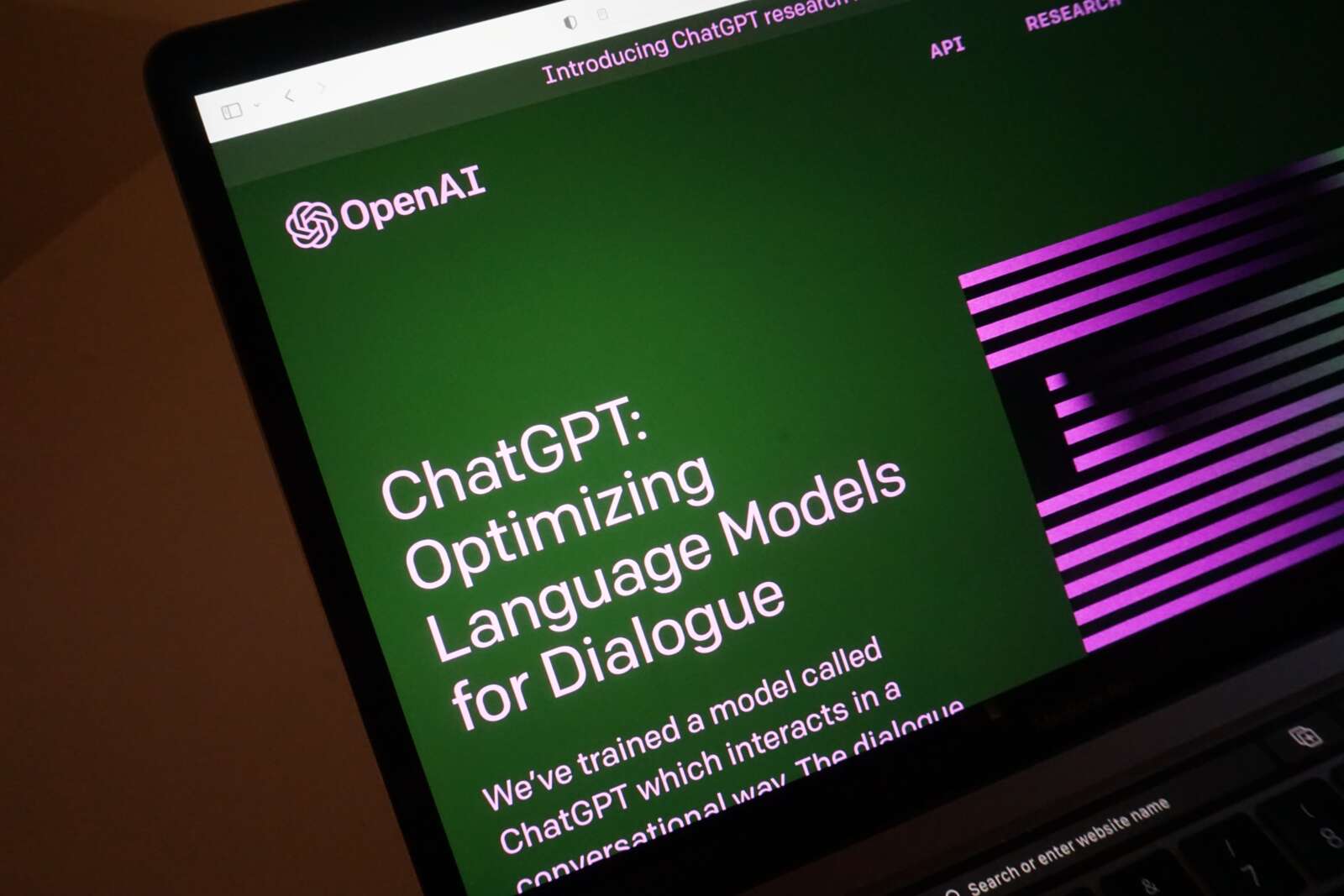
With ChatGPT and other artificial intelligence-based tools becoming increasingly mainstream, Fairfax County Public Schools officials have started discussing potential guidelines to govern how the technology is used in the classroom.
The Fairfax County School Board broached the topic at work session forum on Nov. 28, led by outgoing board chair and Dranesville District representative Elaine Tholen and Sully District representative Stella Pekarsky.
While the discussion wasn’t recorded, Tholen says the school board felt it was a way to make the public aware that FCPS is developing a strategy for how it will handle AI, which is getting integrated into industries from public safety and health care to filmmaking.
“The School Board and FCPS recognizes that a comprehensive AI strategy is crucial for preparing students and educators for the future, enhancing the learning experience, and ensuring the school division remains competitive and adaptive in the rapidly evolving educational landscape,” Tholen said.
AI has been utilized for educational purposes for years, as apps like Duolingo and iNaturalist rely on algorithms that allow them to process data, identify patterns and adapt. But the recent advent of generative AI — which can create text, images and sound based on that data, with OpenAI’s ChatGPT and DALL-E as two high-profile examples — has raised new practical, legal and ethical questions.
In response to fears that students will use AI to cheat or do their homework, New York City Public Schools, Los Angeles Unified and other school districts have banned ChatGPT from their networks, while elsewhere, teachers suggest it could be a useful tool if handled responsibly.
The Highlander, McLean High School’s student newspaper, found that many students have at least experimented with AI, with 40% of 223 surveyed students admitting to utilizing it for at least one school assignment.
Fairfax County Federation of Teachers President David Walrod says the union’s members haven’t raised a lot of concerns about students using ChatGPT, but he’s aware that there are concerns “from teachers more generally across the country.”
“I do think it will require a change to some teaching practices, but I also see potential for positive change,” he told FFXnow.
In addition to using tools that can identify AI, similar to ones used to detect plagiarism, teachers may have to adjust what kinds of assignments they ask students to do at home versus in school, Walrod says. They could also put more emphasis on tasks that require students to show their work, such as an outline, graphic organizer or even a handwritten first draft for an essay.
While the technology presents challenges, it could help teachers by reducing or streamlining their workload. As examples, Walrod shared a hypothetical math lesson plan and discussion questions on the children’s novel “Bud, Not Buddy” generated by ChatGPT, noting that they could serve as “an effective starting point.”
“This doesn’t do all the work for me; I still need to generate examples, I need to find the materials to distribute, etc,” Walrod said by email regarding the math lesson plan. “But it does give me a general outline to follow and allows me to focus on preparing and creating the materials.” Read More

